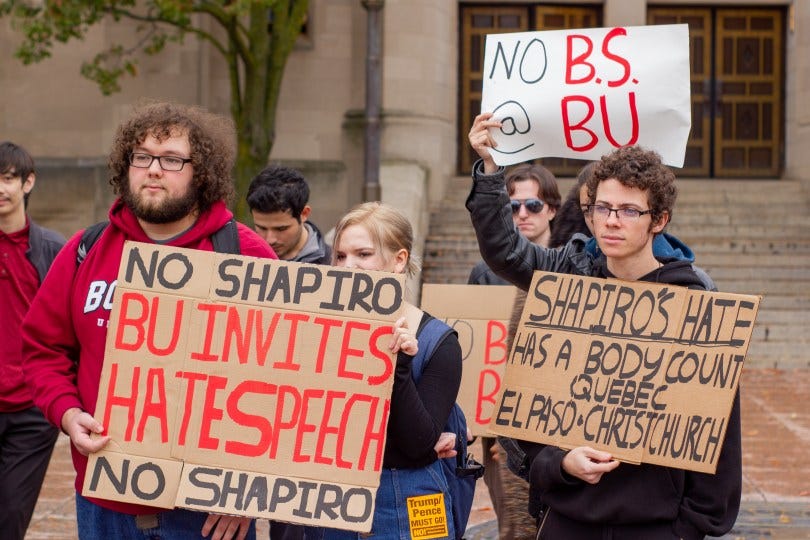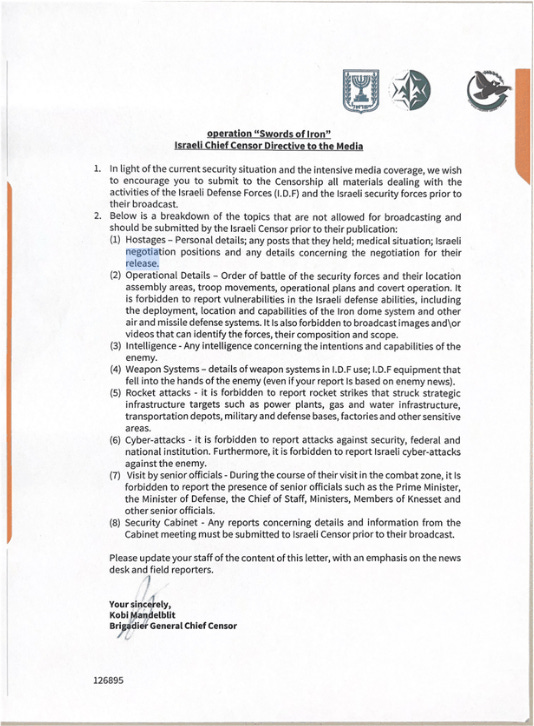A Leftist View Of Free Speech
Substackers Against Nazis, Israeli Censorship, and the True Meaning of Free Speech.
Thanks for reading JoeWrote. Please support my work by liking (click the ❤️ up top), forwarding this article to a friend, and becoming a free subscriber. I appreciate your support.
In Solidarity — Joe
On October 12th, 2023, France banned pro-Palestine demonstrations. But French supporters of Palestine were undeterred. Their protests continued, even in the face of arrest, teargas, and firehoses, creating stark images reminiscent of America’s civil rights movement.
Watching the chaos unfold through my social media, my mind kept returning to a singular thought: “I’m incredibly thankful for the 1st Amendment.” While our government and media are enabling the murder of Gaza, America’s social weariness of government censorship has ensured the U.S. state is not attacking pro-Palestine protests or stopping images of the atrocities from being posted on social media. While I believe the government would like to censor many critics, the public’s fondness for free speech would create an unsurmountable backlash. That is why I, while highly critical of many aspects of American life, am a fan of our free speech culture.
That term, “free speech,” has been the subject of media debate for the past half-decade, a discourse that has muddled its meaning. Every outlet from The New York Times to Fox News has covered alleged “free speech violations,” and a cadre of “free speech journalists” have launched successful careers on their ostensible commitment to speech rights, accruing hundreds of thousands of paying subscribers. But while the Free Speech Discourse has been raging for years, I’ve yet to see any clear, coherent, or consistent definition of “free speech” from those who talk about it the most.
To most Americans, “free speech” has a simple meaning: as established by the 1st Amendment, the government cannot tell you what you can or cannot say. If they try to, it’s censorship. Censorship is dangerous, as it creates an ignorant populace, which empowers the government to breach civil liberties at home and abroad. We see this dynamic manifesting in Israel, which, after the October 7th attack by Hamas, imposed media censorship over its military campaign in Gaza. As images of Palestinian civilian deaths and Israeli war crimes are visible to everyone except Israelis, it has created a unique blindspot: According to Israeli journalists, the Israeli people, who are most empowered to stop the onslaught, are the only ones in the world unaware of the humanitarian crisis in Gaza.
“Hebrew-speaking Israelis watching television news are not exposed at all to what's going on in Gaza. We don't see the atrocities, the rubble, the destruction and the humanitarian crisis. The world sees something completely different." - Anat Saragusti, Israeli War Reporter for Haaretz
This is one reason why I adore the 1st Amendment. Though it has been usurped many times, there is a broad understanding that the government cannot censor us or our media. Though Americans are highly propagandized, our 1st Amendment protections ensure we can at least see the destruction our government is doing in Palestine and speak out against it. Israelis, on the other hand, are prevented from seeing their nation’s carnage and arrested when they even view it, never mind protest against it.
At a base level, Americans recognize this value of the 1st Amendment, which makes them quick to stand against alleged free speech violations. While this is a good instinct, it can lead us astray. In many of the “free speech” cases that dominate online discourse, the issue at hand has nothing to do with the 1st Amendment, the U.S. government, or censorship. Rather, they are about the actions of private actors, companies, and individuals. For one reason or another, media members have packaged these non-governmental issues alongside actual and alleged government censorship and sold it to their audiences as one big “attack on free speech.” This is harmful, as the distinction between a government silencing us and one group of people telling another to “shut the hell up” is as nuanced as it is important. The former is a violation of the 1st Amendment; the latter is not. By blurring the line between real government censorship and campus culture wars, both legacy and independent media have confused large portions of their audience, making it harder to determine actual censorship from the people’s right to tell someone to “get lost.”

This phenomenon recently manifested with Substackers Against Nazis, a letter calling on the company’s leadership to address the many Nazis writing on the platform. (I happily co-signed the letter.) Started by writer Jonathan M. Katz, the letter came under fire as “attempted censorship” and a “free speech violation.” In reality, it was neither of these things. It was not a petition for the U.S. Justice Department to censor Americans, but a condemnation of a private company that amplified Nazis while silencing sex workers. To claim Substackers Against Nazis, the de-monetization of Alex Jones’ YouTube channel, or criticism of Bari Weiss’s shoddy coverage of trans issues as “censorship” is to misunderstand — or, as some have done for their own gain, misrepresent — what free speech is. Free speech is not a Get Out Of Jail Free Card people can play whenever they want to escape criticism or force others to listen to their terrible ideas. It is a social contract between the people and the state, which bars the latter from penalizing the thoughts or expressions of the former. Free speech, in its true form, is a fantastic value, one I hope to enshrine in the radical democracy I aim to build. But it is not and has never been, a reason why college students must welcome race science lecturers or why a private company shouldn’t be criticized for profiting off Holocaust denial.
Free speech is great. But the pseudo-intellectualism that many media charlatans sell as “free speech” to increase their subscriber count is not. It’s unprincipled, a distraction, and it’s usually bullshit.
Thank you for reading JoeWrote. Please like and subscribe to support my work.
What do you think about the ongoing debates about free speech? Share your thoughts in the comments.




People who are loosing their shit about SAN (and about this article) completely bypass the issue that at no point did any of the signatories of the open letter held any power over Substack other than:
- loudly condemning it.
- reaching out to others to do the same.
- ultimately leave it
And that's, to this date, all that they have fucking done. It would seem that all of these valiant free speech warriors think that the only actions consistent with a commitment to free speech are:
- shutting up
- minding your own business
- staying put in places you don't want to be in
It is a very "out of the box" notion of freedom through what we might call "radical compliance".
A very weak analysis. Instead of contributing something meaningful to the discussion that you admit has been going on for quite a long time, you repeat the same tired arguments that have been made a million times over.
In particular, your refusal to grapple with the distinction between the principle of freedom of speech and the first amendment is disappointing but unsurprising.